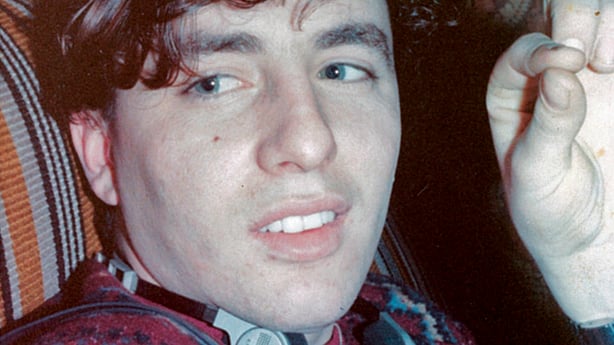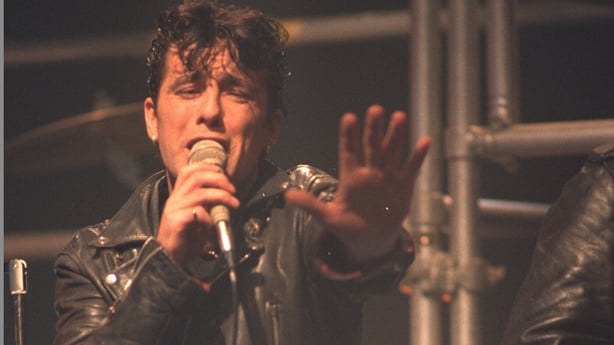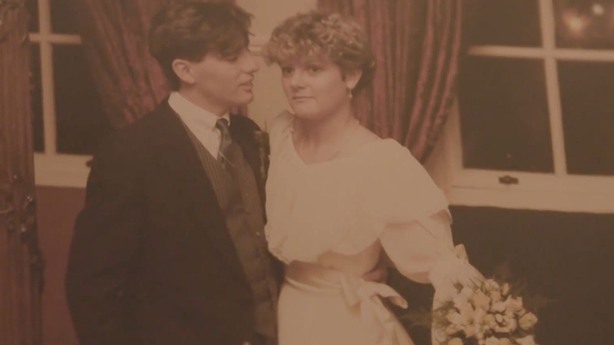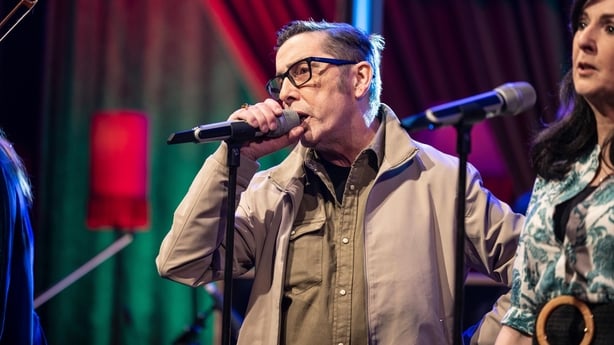Colm O'Callaghan introduces Cloch Le Carn: Christy Dignam, a new RTÉ documentary portrait of the legendary Aslan singer, who died in June this year aged 63.
Sineád Ní Churnáin’s appraisal of the colourful life and times of the late singer and songwriter, Christy Dignam, tells what is at once a scarcely believable story and at the same time a depressingly familiar one.
Using an exhaustive breadth of archive film pulled from the RTÉ libraries, and largely based on the up-close testimonies of Dignam’s wife, Kathryn, his daughter, Keira, and his former band-mate, Tony McGuinness, the film is as much a social history of Ireland from the 1970s onwards as it is the story of yet another high-profile musician lost overboard far too early.
Raised in Finglas on the northside of Dublin, Christy Dignam fronted the rock band, Aslan, for the guts of forty years. A fine story-teller and a terrific frontman and vocalist, he mined those twin gifts to considerable effect, on stage and off. One doesn’t have to be a fan of him or his band to appreciate how magnetic a presence he was.
Watch: Aslan and the RTÉ Concert Orchestra on the Late Late Show
Aslan presented with their working-class credentials to the fore, gallant outsiders who called it as they saw it. In their fresh denims and leathers, and with what was initially a big, aspirational rock and roll sound, they were one of several Irish groups scouted during the mid-1980s in the aftermath of U2’s global breakthrough. They scored an international recording contract with EMI Records and, in the spirit of Spinal Tap, partied often and hard: they were intent on enjoying their fame and vowed to have a good time all the time. As such, it was easy to draw them as a compound of familiar rock and roll shapes, as warriors of the wasteland.
Christy and his band made much of what we might refer to as their 'Authenticity.’ ‘And I never sold my soul,’ is how he pointedly concluded My Crazy World, one of his two autobiographies. The implication was clear: Aslan did it their way, for better, worse, in sickness and in health and, in so doing, stayed true to themselves.

By his own admission, Dignam spent two decades on and off heroin, during which he consorted with some of the most psychotic figures in the Dublin criminal network, at least two of whom have been shot dead. Having spent parts of his childhood being fed from volunteer-run soup kitchens, I’m not sure if a life – in or out of rock and roll – comes any more authentic than that.
Through Aslan’s twin spokespersons - Dignam and his long-time side-kick, Billy McGuinness – the band always espoused old-school values: honesty, graft and what they determined to be quality song-writing. And woe betide anyone who disagreed with them on matters regarding such contested territory. Their targets were manifold and they took aim routinely: music radio programmers, U2, the British music press, manufactured pop music, Louis Walsh, and the music industry generally. But the group was also peddling furiously beneath the water: in Aslan’s world, crazy as it often was, the priority for years was keeping its frontman alive. To this end, Christy Dignam became the great survivor of Irish entertainment and he cheated death several times over the years.
Watch: Aslan perform I Need A Little Time on The Late Late Show
Formed from the ashes of two novice northside outfits, Electron and Meelah XVIII, Aslan began to generate real traction during a series of full-throttle live shows at The Danceline Club in Dublin in the early 1980s. That venue was based in the Revenue Commissioners Social Club on the northside of the city centre and run by ‘Steady’ Eddie Joyce and Pete ‘The Roz’ McCloskey, both of whom worked as civil servants and who also ran the small Danceline Records imprint. In the history of Irish popular music, Eddie and Pete are worthy of more than just casual footnoting. And so too the fact that the social club was eventually closed after a court action led by Senator David Norris.
Alongside the likes of Cactus World News, Les Enfants, Light A Big Fire, Tuesday Blue, Blue in Heaven and Cry Before Dawn, Aslan were prominent in the first wave of the post-U2 back-wash. This was a period during which many young Irish bands, with little or no practical business or music industry nous, were signed to British and American-based record companies on the age-old grounds of raw promise. Simply put, where there was one U2 they may well have been others, and a race was well and truly on to locate them.

And these were golden years. Economically, Ireland might have been on its knees and, for a time, the country’s biggest exports were beef, young people, and rock music. But as with the Irish beef industry, which also revolved around one major player, this period in popular Irish music is marked by commercial folly, expediency, cute hoorism and an obvious lack of quality control.
Musically, far too many of the emerging groups were defined by big, guitar-led anthems and a desire to replicate the sound sculpted by producer Chris Kimsey on Killing Joke’s fine 1985 single, Love Like Blood. On the promotions and marketing wing, meanwhile, a host of fledgling groups were captured in their promotional videos purposefully striding through the city centre late at night, lighting bonfires on Dollymount Strand and planting flags around derelict properties.
This was certainly the case with Aslan. Mother Records, a local imprint run by U2, rejected what would eventually become the band’s excellent breakthrough single, This Is, and which was later issued on Elvera Butler’s Reekus label instead. For years thereafter, they were gauged as much by the inter-parish enmity they apparently carried for U2 as they were for the music they made. Which was radio-friendly, chorus-focused rock and roll that was influenced, at least nominally, by classic Bowie, Pink Floyd, and The Rolling Stones.
Watch: Aslan perform Catch Your Fall on The Saturday Night Show
In Christy Dignam, Aslan had a magnetic leader with a terrific vocal range. But trouble loved him too and never had difficulty in finding him. ‘How can I protect you in this crazy world’, opens Aslan’s best-known song, Crazy World, in which he addresses his family by holding a mirror up to his own body, one that has been well and truly ransacked. Like most of those caught in the throes of addiction, Dignam’s life was regularly pock-marked by chaos, much of which he lived out under the gaze of the public eye. He came to public prominence alongside the arrival of daily tabloid print media in Ireland during the mid-1980s, and into which his story fitted perfectly. He was ideal fodder for the red-tops: working class, smack-addled and with a decent line in patter, he was a regular presence on the front pages.
His sacking by Aslan following the release of the band’s first album in 1988 - and his subsequent re-admittance into their number five years later – was played out in the newspapers in a manner that was new and unique in Irish entertainment circles. A world in which, for decades, what went on on the road tended to stay there. It is worth pointing out here that the Irish showband circuit that was at its peak in the late 1960s – and the broader domestic entertainment sector more generally - has just as many of its own ghosts, bad seeds and appalling personal legacies. Most of these stories have long been buried, many more of them will never be told.

Christy just put it all out there regardless, and recklessly so at times. He always gave great copy and enjoys the distinction of telling the same story to two different biographers thirteen years apart. Even so, several passages in both books – This Is, published in 2004, and 2017’s My Crazy World, make for unsettling reading. And perhaps none moreso than in one small, throwaway line towards the end of My Crazy World when Dignam writes that ‘if I’ve left out certain things it’s not to show myself in a shining light – it’s to avoid causing hurt to certain people and, in a couple of cases, to save myself from going to prison.’
Sexually abused from the age of six, much of Christy’s adult life has been blighted by addiction and illness and so it’s easy to lose sight of the scale of Aslan’s achievement against that backdrop. But with the singles This Is (1986) and Crazy World (1993), the band has contributed handsomely to the canon of great Irish pop music and both releases are as important in their own way as, say, The Boys Are Back in Town by Thin Lizzy and Pride by U2.

Re-invented in the autumn of his career as a cuddly grandfather in specs who did a regular turn on The Late Late Show, it can be easy to forget how forceful a vocalist Dignam was at his peak. A trained singer who worked with the veteran voice coach, Frank Merriman, his voice was scalded over the years by lifestyle, illness and the inevitable onslaught of age. But by any measure, Aslan were at their most potent when Christy’s voice was at its most powerful, notably on the band’s first album, Feel No Shame (1988), produced by Mick Glossop, and it’s long-delayed follow-up, Goodbye Charlie Moonhead, released in 1994. Aslan’s considerable live prowess – with Christy at his most compelling – is captured on a live album, Made in Dublin (1999), recorded at Vicar Street, and which was accompanied by a full documentary.
Christy Dignam battled ill-health for many years and routinely spoke about his long struggle to stay well. As Ní Charmain’s fine portrait reminds us, he refused to be beaten down by the hand he was dealt and was still gamely and defiantly centre-stage, connecting with his audiences, even towards the end of his life.
Watch: Christy Dignam performs The Band Played Waltzing Matilda on The Late Late Show
Always fiercely proud of Aslan’s body of work, one of the more interesting aspects of the band’s career is how pragmatic they became the more of the entertainment industry they encountered. The driver for which, of course, was something far more fundamental and existential. Because given the chaos that often characterised much of his private life, you’d suspect that it was in Aslan’s arms that Christy Dignam found at least some sort of certainty, protection, and release. To this end, his story is defined as much by a search for safety and his efforts to quell his own doubts as it is by his music.
Cloch Le Carn: Christy Dignam, RTÉ One, Wednesday, December 27th, at 6.30 pm.
A version of this piece first appeared on The Blackpool Sentinel blog.


